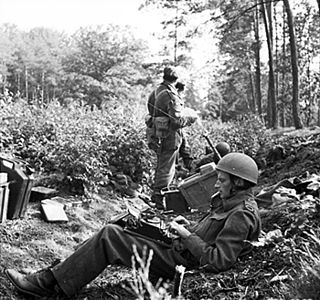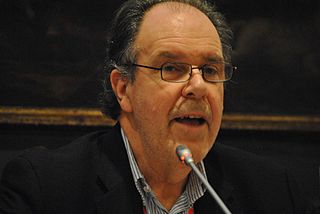
The Asian American Journalists Association (AAJA) is a 501(c)3 nonprofit educational and professional organization based in San Francisco, California with more than 1,500 members and 21 chapters across the United States and Asia. The current president is Washington Post reporter Michelle Ye Hee Lee. The executive director is Naomi Tacuyan Underwood.

A war correspondent is a journalist who covers stories first-hand from a war zone.

Colonel Sir Reginald Hugh Dorman-Smith, GBE was an Anglo-Irish diplomat, soldier and politician in the British Empire.

The NewsGuild-CWA is a labor union founded by newspaper journalists in 1933. In addition to improving wages and working conditions, its constitution says its purpose is to fight for honesty in journalism and the news industry's business practices. The current president is Jon Schleuss.

Anthony Michell Howard, CBE was a British journalist, broadcaster and writer. He was the editor of the New Statesman and The Listener and the deputy editor of The Observer. He selected the passages used in The Crossman Diaries, a book of entries taken from Richard Crossman's The Diaries of a Cabinet Minister.
Foreign Correspondents' Club is a group of clubs for foreign correspondents and other journalists. Some clubs are members only, and some are open to the public.
The British Garden Media Guild,, is a trade organisation for professional garden writers, journalists, photographers, broadcasters and members of allied trades. The Guild was established in 1991 to improve the quality of garden writing, photography and broadcasting by improving links between the gardening mass media and the horticultural industry and keeping its members up-to-date with events in the world of gardening and horticulture. The Guild also aims to help its members operate efficiently and profitably and improve liaisons between garden writers, photographers, publishers and more.
Wilfrid EgglestonOBE was an Anglo-Canadian journalist, author and civil servant. Born in Lincoln to middle-class English parents, he relocated to Netherfield, Nottinghamshire where his father was convinced to move the family to a ranch in Orion, Alberta. Suffering from boredom in his teenage years, Eggleston advanced his basic English education through a fast-track course at Regina College, which qualified his entrance to Queen's University in 1926. Graduating in 1928, he found journalistic work at the Lethbridge Herald before occupying his role as Ottawa correspondent for the Toronto Star by the following year, becoming parliamentary correspondent before his resignation in 1936.

Women in journalism are individuals who participate in journalism. As journalism became a profession, women were restricted by custom from access to journalism occupations, and faced significant discrimination within the profession. Nevertheless, women operated as editors, reporters, sports analysts and journalists even before the 1890s in some countries as far back as the 18th-century.

The English Mistery was a political and esoteric group active in the United Kingdom of the 1930s. A "Conservative fringe group" in favour of bringing back the feudal system, its views have been characterised as "reactionary ultra-royalist, anti-democratic". It was against everything to do with welfare, the London School of Economics, and the United States.
The Motor Press Guild(abbreviated MPG) is the largest professional automotive media association in North America. This Los Angeles-based non-profit association is made up of professionals in motoring journalism and news media. Their goal is to promote education and information exchange within the motoring press.

John Lloyd is a journalist, presently contributing editor to the Financial Times and an Associate Fellow of Nuffield College, Oxford.

Margaret Thatcher was Prime Minister of the United Kingdom from 4 May 1979 to 28 November 1990, during which time she led a Conservative majority government. She was the first woman to hold that office. During her premiership, Thatcher moved to liberalise the British economy through deregulation, privatisation, and the promotion of entrepreneurialism.
The Guild of Food Writers is the professional association of food writers and broadcasters in the United Kingdom. It has over 550 authors, broadcasters, columnists and journalists amongst its members.
The Agriculture and Horticulture Development Board (AHDB) is a levy board funded by farmers and growers and some other parts of the supply chain. It aims to enhance farm business efficiency and competitiveness in the areas of: pig, beef and lamb production in England; milk, potatoes and horticulture in Great Britain; and cereals and oilseeds in the UK. It undertakes research and development and farm-level knowledge transfer activity, provides essential market information to improve supply chain transparency and undertakes marketing promotion activities to help stimulate demand and to develop export markets. These are activities which most individual farm businesses could not afford to do themselves.

Blue Badge Tourist Guides are the official, professional tourist guides of the United Kingdom. They wear a Blue Badge to indicate their professionalism. They are recognised by local tourist bodies throughout the UK, and by Visit Britain as Britain’s official tourist guides. There are over 2000 Blue Badge guides in England, Scotland, Wales, and Northern Ireland, who guide at Britain's tourist attractions and cities. Some guides run guided walking tours on themes such as Jack the Ripper and The Beatles.
The Sports Journalists' Association (SJA) is an association for British sports journalists. It represents the British sports media on the British Olympic Association's press advisory committee and acts as a consultant to organizers of major events who need guidance on media requirements as well as seeking to represent its members' interests in a range of activities. Its president is Patrick Collins, the distinguished former sports columnist for the Mail on Sunday who succeeded veteran broadcaster and columnist Sir Michael Parkinson in the role. Membership is open to journalists, photographers, broadcasters, reporters, editors, and cartoonists. However, in order to obtain a full membership you have to be a journalist based in the United Kingdom.

From October 1988 to September 1994 the British government banned broadcasts of the voices of representatives from Sinn Féin and several Irish republican and loyalist groups on television and radio in the United Kingdom (UK). The restrictions, announced by the Home Secretary, Douglas Hurd, on 19 October 1988, covered eleven organisations based in Northern Ireland. The ban followed a heightened period of violence in the course of the Troubles, and reflected the UK government's belief in a need to prevent Sinn Féin from using the media for political advantage.

Leonard Dudeney (1875–1956) was an English newspaper editor, journalist and confidant of Ramsay MacDonald. He was acting and assistant editor in Shanghai for the North China Daily News between 1902 and 1907, Parliamentary Gallery and Lobby correspondent at the Daily Express between 1916 and 1918 and held the same position at the Daily Sketch between 1921 and 1944. As editor of the Leicester Pioneer between 1908 and 1911, when Ramsay MacDonald was MP for Leicester, MacDonald regularly sought counsel from Dudeney on Far Eastern matters where Dudeney was experienced and connected.











